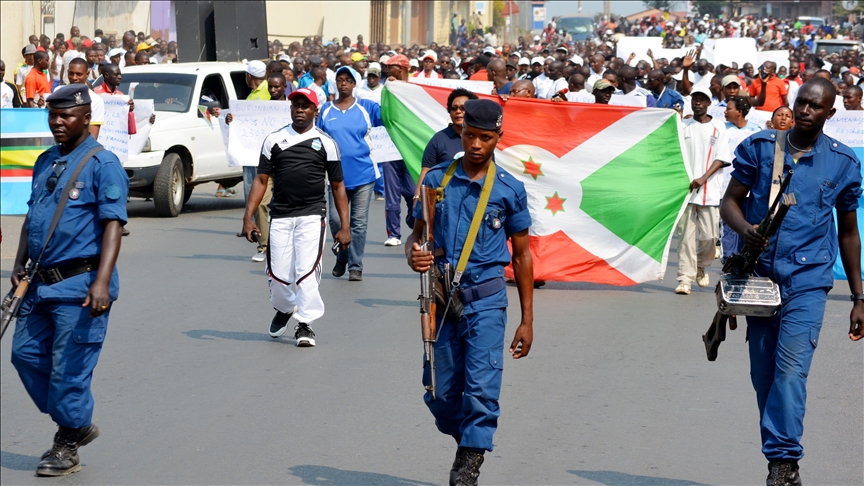EXPLAINER - Burundi-Rwanda row: Another escalation in regional tensions?
Burundi severed relations and closed its border with Rwanda early this month, accusing Kigali of backing Burundian insurgents in DR Congo

- Interstate conflicts undermine East African Community bloc’s integration, say analysts
- Recent negative developments are a serious threat to regional peace and security, warns retired diplomat Harold Acemah
KIGALI, Rwanda
Burundi’s recent closure of its border with neighboring Rwanda is an ominous development in Rwanda’s already tense relationship with its neighbors, say analysts.
Both countries belong to the East African Community (EAC), an eight-member regional economic bloc whose overall ambition is to form a political federation.
Burundi announced that it had severed relations and closed its border with Rwanda early this month following accusations that Kigali is backing Burundian insurgents operating in the Democratic Republic of Congo.
The closure came about two weeks after Burundi's President Evariste Ndayishimiye accused Rwanda of backing the Red-Tabara rebel group, a charge Rwanda denies.
The rebel group waged a war against Burundi's government in 2015.
In the latest development likely to increase tensions, Rwanda on Monday accused President Ndayishimiye of “inciting divisions among Rwandans” and “jeopardizing peace and security in the Great Lakes region.”
Observers say the current tension will probably not lead to all-out war, but the escalating conflict certainly tests the EAC’s integration.
“Definitely the recent closure of the border by Burundian authorities has already contributed to the escalating tensions between the two neighbors, but I am quite skeptical that this situation may lead to a full blown war between the two states,” Louis Gitinywa, a Rwandan-based political analyst, told Anadolu.
“I think both parties will continue to cultivate restraint, as an open war is not serving any of their interests,” he added.
Relations between the two neighbors were beginning to normalize after years.
In 2015, after the failed coup attempt, Burundi closed its border with Rwanda and reopened it after more than five years.
The accusations from Burundi underscore the tense relationship between Rwanda and its neighbors.
In the Democratic Republic of Congo, Rwanda is accused of backing M23 rebels battling government forces in the east, a claim Kigali flatly denies.
Accusations against Rwanda
Gitinywa thinks the reasons why Rwanda faces accusations of supporting insurgents remain murky.
“I think this is a false assessment of the situation, or I would say the wrong lecture of the regional geopolitical context,” he said.
“But you also must keep in mind that this situation of instability across the region is rooted in the mess the whole region inherited from the 1994 genocide against the Tutsi ethnic group and the Burundian crisis of 1993...Unfortunately many regional analysts tend to forget the genesis of this crisis, or some try to pull it down under the rug.”
Rwandan President Paul Kagame told a national forum in Kigali on Tuesday that he wonders why Rwanda is always associated with the M23 fighters in eastern Congo but noted that contrary to allegations, “Rwanda did not, in any way, create this fighting in eastern Congo.”
“Blaming Rwanda for the M23 conflict in eastern Congo, I cannot tell you the reasons exactly why that would be happening.”
Expressing strong words, Kagame said he will not hesitate to defend Rwanda from any threats.
Test for EAC integration
Harold Acemah, a political scientist based in Uganda’s capital Kampala, noted numerous interstate conflicts in the region which he said do not augur well for EAC integration.
He cited accusations made by Burundi against Rwanda and the border closure, the row between Kenya and Tanzania over air rights for Kenya Airways and Air Tanzania and the rift between the Democratic Republic of Congo and Rwanda.
“These negative developments are a serious threat to regional peace and security and will affect trade and the free flow of goods and services within the EAC,” Acemah, a retired diplomat, said in an interview.
Peter Mathuki, the EAC secretary general, in a statement on Jan. 12 encouraged partner states of the bloc to resolve their disputes through peaceful means and exercise restraint in the spirit of the bloc’s treaty, which emphasizes peaceful coexistence and good neighborliness.
But to Gitinywa, a constitutional lawyer, these interstate tensions simply shed more light on what many analysts have been pointing out --that the EAC secretariat is toothless.
He also believes the admission of new entrants to the community is done at the expense of consolidating the integration.
The Democratic Republic of Congo and Somalia are the latest countries to be admitted to the bloc.
“The DR Congo case is a blatant example where the EAC has shown its shortcomings by failing to find a sustainable solution to the political and security crisis in the eastern part of the country, mainly due to divergent interests of member states and a lack of coordination by the secretariat for a concerted peace roadmap,” said Gitinywa.
Acemah urged the chairman of the EAC Summit, South Sudan’s President Salva Kiir, to urgently convene an emergency meeting on political solutions to disputes between member states, where the African Union and UN could be invited to participate as observers, mediators and facilitators.
Kiir, meanwhile, has announced plans to assign special envoys to support efforts in addressing inter-state relations within a regional framework.
“The objective and goal is to diffuse tension in the Great Lakes Region and prevent the prevailing situation from deterioration and escalation into conflict and war. The sooner the EAC Summit is convened, the better for the EAC and for deepening regional integration,” said Acemah.
Anadolu Agency website contains only a portion of the news stories offered to subscribers in the AA News Broadcasting System (HAS), and in summarized form. Please contact us for subscription options.




